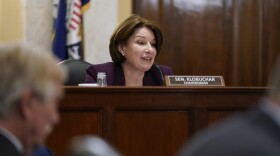
Pam Fessler
Pam Fessler is a correspondent on NPR's National Desk, where she covers poverty, philanthropy, and voting issues.
In her reporting at NPR, Fessler does stories on homelessness, hunger, affordable housing, and income inequality. She reports on what non-profit groups, the government, and others are doing to reduce poverty and how those efforts are working. Her poverty reporting was recognized with a 2011 First Place National Headliner Award.
Fessler also covers elections and voting, including efforts to make voting more accessible, accurate, and secure. She has done countless stories on everything from the debate over state voter identification laws to Russian hacking attempts and long lines at the polls.
After the Sept. 11 terrorist attacks, Fessler became NPR's first Homeland Security correspondent. For seven years, she reported on efforts to tighten security at ports, airports, and borders, and the debate over the impact on privacy and civil rights. She also reported on the government's response to Hurricane Katrina, The 9/11 Commission Report, Social Security, and the Census. Fessler was one of NPR's White House reporters during the Clinton and Bush administrations.
Before becoming a correspondent, Fessler was the acting senior editor on the Washington Desk and NPR's chief election editor. She coordinated all network coverage of the presidential, congressional, and state elections in 1996 and 1998. In her more than 25 years at NPR, Fessler has also been deputy Washington Desk editor and Midwest National Desk editor.
Earlier in her career, she was a senior writer at Congressional Quarterly magazine. Fessler worked there for 13 years as both a reporter and editor, covering tax, budget, and other news. She also worked as a budget specialist at the U.S. Office of Management and Budget, and was a reporter at The Record newspaper in Hackensack, New Jersey.
Fessler has a master's of public administration from the Maxwell School at Syracuse University and a bachelor's degree from Douglass College in New Jersey.
-
The Alexandria Eviction Prevention Partnership in Northern Virginia is one of the divergent programs meant to help fight off evictions.
-
With the CDC eviction moratorium extended for a final month, efforts are underway to speed up distribution of billions of dollars in rental assistance and set up eviction diversion programs.
-
The housing gap between Black and white homeowners has been consistent for decades, and so far it continues to widen.
-
The Centers for Disease Control and Prevention says the pandemic presented a historic threat.
-
The nation's homeless population is expected to rise in the coming months, especially if a federal eviction moratorium ends in June.
-
The Senate Rules Committee held a contentious markup of legislation to revamp the nation's voting and campaign finance rules, laying bare the deep partisan divide over how elections should be run.
-
The federal government plans to release $5 billion in new housing vouchers to help those at risk of homelessness. Low-income tenants often struggle to find landlords who will accept such vouchers.
-
Many of them work in service industries —as cooks, Uber drivers, nursing aides— jobs that have been especially affected this past year. "I don't have money to pay rent," resident Mahlet Kassa says.
-
The annual homeless count by the Department of Housing and Urban Development shows an increase in people living outside. The 2020 numbers in the report do not reflect the impact of the pandemic.
-
Congress approved $25 billion in emergency rental assistance to keep people housed during the pandemic, but states are facing glitches on the federal moratorium for renters and landlords.










